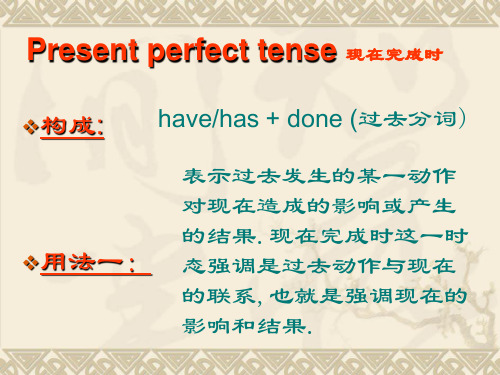现在完成时态课件
现在完成时课件全

答案:haven't been
解析:句意表示“自从上个月以来,我还没有去过电影院”,表示从过 去某一时刻到现在为止的动作,用现在完成时,且“have+be动词”表 示状态,故用haven't been。
填空题练习
• 题目1: They ___(live) in this city for ten years.
04
现在完成时的注意事项
现在完成时与一般过去时的区别
总结词
两者都表示过去发生的动作,但侧重 点不同。
示例
I have read the book.(我已经读过 这本书了,现在我知道书的内容了。
)
详细描述
现在完成时强调的是这个动作对现在 的影响或结果,而一般过去时只是单 纯地表示过去某个时间点发生的动作 ,不涉及现在的情况。
填空题练习
答案及解析:
答案:have read
解析:句意表示“我已经读过这本书两次了”,表示从过去某一 时刻到现在为止一直进行的动作,用现在完成时,且“read”表 示阅读,故用have read。
翻译题练习
题目1: 我已经完成了我的作业。(翻译成英文 )
答案:I have finished my homework.
yet
常用于否定句或疑问句,表示某动作还未 完成。例如:“Have you finished your homework yet?”(你作业写完了吗? )
ever
常用于疑问句,表示曾经做过某事。例如 :“Have you ever been to the Great Wall?”(你曾经去过长城吗?)
填空题练习
01
答案解析:
02
答案:have lived
现在完成时ppt精品课件

B: Where did you buy it?
A: I bought it in my hometown. A: have you seen the film? B: Yes, I have. A: When did you see it? B: I saw it last Sunday.
现在完成时不能与表示过去的时间状语连 用,常与之连用的时间状语有:
6. Mr. Brown has had his TV __f_o_r__ 15 years. 7. I’ve taken driving lessons __s_in_c_e__last month.
8. My sister has had her cell phone _f_o_r___a month .
He studied English for five years.
(只说明他过去学过五年英语,但现在不学了。)
❖ I’ve lived here for ten years. 我在这里住了 10年。(现在仍住这儿)
❖ I lived here for ten years. 我在这里住过10 年。(现在不住这儿了)
再加“ ed ”。 , study---studied---studied
cry---cried---cried
(4)、重读闭音节结尾,末尾只有一个辅音字母, 先双写该辅音字母,再加“ ed ”。
stop---stopped---stopped drop---dropped--dropped
2、不规则变化
当有 so far, in/during/over the past/ last few days(在过去/最近的几年里),since 接过去时间状语或过去时的句子等常用 现在完成时 (不能与确定的时间)
现在完成时态课件(共68张PPT)

yet for just before
ever
never since so far
already
up to now
have planted They ______________over 20,000 fruit
trees up to now . (plant )
Key words
yet for just before
否定句:句末 “还(没)” I haven’t had breakfast yet.
疑问句: 句末 “己经” Have you had breakfast yet?
注意:当在肯定句中含already或 just,变否定时,在句末加yet。
●
I have already seen the film. I haven’t seen the film yet.
Key words
yet for just before
ever
never since so far
already
have only ____________ discussed the first We _______
five questions so far. (discuss )
Key words
现在完成时
The Present Perfect Tense
一 构成:
have/has+动词过去分词 (pp)
肯定 主语+have/has + pp 否定 主语+have/has not + pp 疑问 Have/Has + 主语+ pp+其他 Yes, 主+have/has. No, 主+haven’t/hasn’t.
现在完成时ppt课件

过去完成时由“had+过去分词”构成,而现在完成时由 “have/has+过去分词”构成。
动作的完成情况不同
过去完成时表示动作在过去某一时间之前已经完成,而现在完成时 则表示动作在过去发生后对现在造成了影响或结果。
PART 05
现在完成时的常见错误
REPORTING
忽略现在完成时的使用场合
PART 03
现在完成时的特殊用法
REPORTING
与already连用的用法
总结词
already是现在完成时的常用副词之一,用于表达某件事情已经完成或已经发 生。
详细描述
在现在完成时中,already通常用于肯定句中,表示某件事情已经完成或已经发 生,常与have或has连用。例如,“I have already finished my homework.”(我已经完成了我的作业)。
总结词
不重视现在完成时的应用场景
详细描述
有些英语学习者在运用现在完成时的时候, 不注意它所适用的场合。现在完成时主要用 来描述过去发生的动作或状态对现在造成的 影响或结果,比如:“I have finished my homework”(我已经完成了我的作业)。
混淆现在完成时与一般过去时的使用场合
现在完成时ppt课件
REPORTING
• 现在完成时的定义和构成 • 现在完成时的基本用法 • 现在完成时的特殊用法 • 现在完成时与一般过去时的区别 • 现在完成时的常见错误 • 现在完成时练习题及答案解析
目录
PART 01
现在完成时的定义和构成
REPORTING
现在完成时的定义
现在完成时是英语语法中的一种时态 ,通常由助动词have/has + 过去分 词构成,用于描述过去发生的动作或 状态对现在产生的影响或结果。
《现在完成时态》ppt课件

现在完成时态
CATALOG
DATE
ANALYSIS
SUMMARY
目录
CONTENTS
• 现在完成时态的定义 • 现在完成时态的用法 • 现在完成时态与一般过去时的区别 • 现在完成时态的特殊用法 • 现在完成时态的练习与解析
REPORT
CATALOG
DATE
ANALYSIS
SUMMAR Y
翻译练习
总结词
跨文化理解
总结词
句型转换能力
详细描述
通过将英文句子翻译成中文,学生可以更 好地理解现在完成时态在中文表达中的对 应形式,促进跨文化交流和理解。
详细描述
翻译练习不仅要求学生掌握时态的转换, 还需要注意句型的变化和语言的流畅性, 有助于提高学生的语言运用能力。
REPORT
THANKS
感谢观看
用于描述过去发生的某个事件或经历, 并强调该事件或经历对现在的影响或 结果。
用于表达对过去某个时间点或时期的 情况的回忆或回顾。
REPORT
CATALOG
DATE
ANALYSIS
SUMMAR Y
03
现在完成时态与一般过 去时的区别
时间点的区别
01
过去时描述过去某个时间点发生 的事情,强调事情发生的时间点 。
CATALOG
DATE
ANALYSIS
SUMMAR Y
这个句子中的“Have you seen” 表示询问对方是否已经完成了动 作“看电影”,强调了动作的完
成状态。
REPORT
CATALOG
DATE
ANALYSIS
ቤተ መጻሕፍቲ ባይዱ
SUMMAR Y
05
《现在完成时态》课件

05
现在完成时态的练习与巩固
选择题练习Leabharlann 01选择题1I ____(not see) the film yet.
02
答案
haven't seen
03
选择题2
He ____(not read) the book.
04
答案
hasn't read
填空题练习
填空题1
He ____(not finish) his homework yet.
02
现在完成时态的语义
已完成动作对现在的影响
01
已完成的动作或行为对现在的情 况或状态产生了影响。
02
例如:“我已经吃过饭了,现在 不饿。”
已完成动作与现在的联系
强调某个已完成的动作或行为与现在 的时间点有直接联系。
例如:“他去年买的车,现在还在开 。”
已完成动作与未来的关系
已完成的动作或行为对未来有一定的预示或影响。 例如:“我已经学了三年英语,未来打算去英国留学。”
现在完成时态的用法
总结词
现在完成时态可以用于描述已经完成的动作或状态,强调对现在的影响或结果,也可以用于表达推测、可能性和 虚拟语气等。
详细描述
现在完成时态常用于描述已经完成的动作或状态,并强调这些动作或状态对现在的影响或结果。例如,“我已经 吃过饭了”表示“我现在不需要吃饭”。此外,现在完成时态还可以用于表达推测、可能性和虚拟语气等,例如 “他可能已经回家了”和“如果我早点出发,现在已经到了”。
与since引导的时间状语连用
总结词
表示某个动作或状态从某一时间点开始一直持续到现在,并且这个动作或状态已经完成 。
详细描述
在现在完成时态中,当与since引导的时间状语连用时,表示某个动作或状态从某一时 间点开始一直持续到现在,并且这个动作或状态已经完成。例如,“I have studied English since I was 5 years old.”这句话表示说话者从5岁开始学习英语,一直学到
现在完成时态课件

其他易错点提示
要点一
忘记在助动词后加动 词的过去分词形式
例如,“I have go to the park.” (错误),应改为“I have gone to the park.”(正确)。
感谢您的观看
不规则动词变化举例
be - was/were have - had
go - went
不规则动词变化举例
do - did see - saw
eat - ate
不规则动词变化举例
01
take - took
02
make - made
03
find - found
04
bring - brought
特殊情况处理技巧
例如
I have already finished my homework.(我已经完成我的作业了。)
否定句结构和用法
现在完成时态否定句的基本结构是
主语+have/has+not&# watched the movie yet.(她还没有看过那部电影。)
疑问句结构和用法
现在完成时态课件
contents
目录
• 现在完成时态基本概念 • 现在完成时态用法详解 • 动词变化规则及特殊情况处理 • 句子结构和用法举例 • 常见错误及注意事项 • 练习与巩固环节
01 现在完成时态基本概念
定义与用法
现在完成时态表示过去发生的动作对现在 造成的影响或结果,或表示从过去某个时 间点开始一直持续到现在的动作或状态。
经历与经验
现在完成时态还可以表示过去的经历或经验,这些经历或经验对现在的情况或 行为产生影响。例如,“He has traveled to many countries.”(他去过很多 国家。)
现在完成时讲解课件

现在完成时的基本句型:
肯定式:主语 + 助动词have/has + 动词的过去分词. 疑问式:助动词Have/Has + 主语 + 动词的过去分词? 否定式: 主语 + 助动词have/has + not + 动词的过去分词.
例句:
6. Has he gone to the library ? 他是去了图书馆吗? Yes ,he has. 是的,是去那里了。 No, he hasn’t. 不,他没去那里。
Eg. I have been here since 2000. I have been here since 5 years ago. I have been here since I graduated in 2000.
since , for 的用法:
since: (自…以来)
1)since+时间点 He has stayed here since 5 o’clock. 2)since+ 时间段+ ago He has stayed here since 5 hours ago. 3)since+ 从句 She has taught English since he came here.
现在完成时
现在完成时 ( present perfect tense)
past
present(now)
future
do my homework
现在完成时的构成
have (has)+ 过去分词
上一页
主菜单
下一页
Mother: John, clean your teeth please. John: Mum, I have already(已经) cleaned them.
现在完成时ppt课件

((√×))
He has joined the League member for two years. ( ×)
√ He has been a League member for two years. ( )
他已入团两年了。
The man has been dead for several years. The man has died for several years. 这个人已经死了几年了。
• Mr. Green _h_a_s__b_e_e_n_ (be) in China these
years.
• They _h__a_v_e_w_r_i_t_te_n_(write) 15 songs so far.
• The population __h_a_s__g_r_o_w_n__ (grow) more
slowly in the past ten years.
现在完成时的谓语动词
1延续性动词:learn, work, know, walk, keep, have, wait, sing, read, sleep, live, stay
延续性动词用法特征: 延续性动词可以用于现在完成时,其完成时态可与表 示一段时间的状语连用。(for ten years, since last year, since two years ago, during the past three years, how long等)
have been to 曾经去过某地(已返回)
Someone went to some place and has already
come ban 去某地一段时间
someone stay in some place for some time
现在完成时态PPT课件

Never.
write wrote written a ride rode ridden 6
for+一段时间
since+过去时态的句子 一段时间+ago since+ 过去的时间点 具体的过去的时间点
E.g. Kate has lived here for 3 years.
Kate has lived here since 3 years ago.
Kate has lived here sinace she came to China. 8
现在完成时态
城厢中学 谭娟
a
1
现在完成时 Present perfect tense
❖构成: 助动词have/has + 过去分词
1.肯定句 现在完成时的肯定句式是“have(has)+过去分词”。
注意:该句式中的have或has是助动词,has用于第三人 称单数,其它人称一律用have。
eg. He has eaten supper.
常见非延续性动词和延续性动词的转变
❖ 第一类:动词
be + adj.
❖ die be dead finish be over
❖ open/close be open/closed
❖ fall ill/asleep be ill/asleep ❖ marry sb/get married to be married to
be
❖ put on
现在完成时课件

现在完成时课件一、现在完成时的定义和构成现在完成时是英语中一个非常重要的时态,它用来表示过去发生的动作或状态对现在造成的影响或结果,或者过去开始的动作一直持续到现在。
现在完成时的构成是“have/has +过去分词”。
其中,“have”用于主语是第一人称(I、we)、第二人称(you)以及复数主语(they、the boys 等);“has”用于主语是第三人称单数(he、she、it、Tom 等)。
例如:I have seen this film before(我以前看过这部电影。
)He has finished his homework(他已经完成了他的作业。
)二、现在完成时的基本用法1、表示过去发生的动作对现在造成的影响或结果这种情况下,动作发生在过去,但强调其结果或影响与现在有关。
例如:I'm very tired I have worked for hours(我很累。
我已经工作了几个小时。
)这里“工作”这个动作发生在过去,但“累”这个结果是现在的感受。
2、表示过去开始的动作一直持续到现在,并可能继续下去常和“for +时间段”“since +时间点”连用。
例如:I have lived here for ten years(我在这里住了十年了。
)She has known him since 2010(她从 2010 年就认识他了。
)3、在 this morning/week/month/year 等时间状语中,表示到目前为止已经发生的事情。
例如:I have written three letters this morning(今天上午我已经写了三封信。
)三、现在完成时的时间状语1、“for +时间段”如:for two days(两天)、for five years(五年)2、“since +时间点”如:since 1998(自从 1998 年)、since last week(自从上周)3、 already(已经),通常用于肯定句中例如:He has already left(他已经离开了。
《现在完成时》课件

05
CATALOGUE
现在完成时的练习与巩固
选择题练习
总结词
考察对现在完成时的理解
详细描述
设计多个选择题,选项中包括现在完成时的正确形式和常见的错误形式,让学生通过选择题练习加深 对现在完成时的理解。
填空题练习
总结词
检验对现在完成时的掌握程度
详细描述
提供句子,让学生填写正确的现在完 成时态,通过填空题练习,让学生在 实际运用中掌握现在完成时的正确形 式。
翻译练习
总结词
提升对现在完成时的运用能力
详细描述
选取一些中文句子,要求学生将其翻译成英文,并确保使用 正确的现在完成时态。通过翻译练习,让学生在实际语境中 运用现在完成时,提高语言运用能力。
THANKS
感谢观看
混淆现在完成时和一般现在时
总结词
两者都表示现在的状态或动作,但意义不同。
详细描述
现在完成时表示某个动作已经完成并对现在有影响,而一般现在时只是描述现在 的情况或习惯性的动作。例如,“I have finished my homework”表示作业已 经完成,而“I finish my homework every day”只是表示每天的作业习惯。
结构
have/has + 过去分词
用法
描述过去发生的动作对现在的影响或结果,强调 动作的完成和现在的状态。
现在完成时的基本结构
基本结构
主语 + have/has + 过去分词 + 其他成分
注意事项
过去分词的形式必须与主成时的时态标志
时态标志
have/has + 过去分词
例子
现在完成时态ppt课件

He died two years ago.
He has been dead for two years /since two years ago
It is/ has been two years since he died.
Two years has passed since he died
❖ 7. Jim has gone to Beijing for 2 years. has been in
❖ 8.What time have the factory opened?
did
open
❖ 9.I have gone to Chunhua Middle School twice been to
I have bought a new apartment for a month 错误 I have had a new apartment for a month 正确
常见非延续性动词和延续性动词的转变
❖ arrive/come/go to/reach be in
❖ borrow
keep
❖ leave
❖ eg: I have lost my wedding ring. 我丢了 我的结婚戒指(这一动作虽然发生在过去, 但影响持续到现在,其结果是我现在没有结 婚戒指了)
❖ I have sent him a Christmas card.
❖ He has just bought a new house.
❖ Tom 在哪儿? 他去书店买书了。 -Where is Tom?
-He has gone to the bookshop to buy some books. ❖ 我在北京待了5年了。
《现在完成时态》课件

现在完成时态
汇报人:PPT
目录
CONTENTS
01 添加目录标题
02 现在完成时态的定 义
03 现在完成时态的用 法
04 现在完成时态的特 殊用法
05 现在完成时态的注 意事项
06 练习与巩固
添加章节标题
现在完成时态的定义
定义:现在完成时态表示过去发生 的动作对现在产生的影响或结果, 强调动作的完成和影响。
现在完成时态与“for + 时间段”连用:表示从过去某一时刻开始,持续到现在的动 作或状态。
现在完成时态与“since + 时间点”连用:表示从过去某一时刻开始,持续到现在 的动作或状态。
现在完成时态与“for + 时间段”和“since + 时间点”连用:表示从过去某一时刻 开始,持续到现在的动作或状态。
03
过去时态通常用于描述一次性的动作 或状态,现在完成时态通常用于描述 多次发生的动作或状态。
过去时态通常与明确的时间状语连 用,如yesterday, last week 等, 现在完成时态通常与表示一段时间
的状语连用,如since, for等。
02
过去时态通常用于描述过去的事实或 经历,现在完成时态通常用于描述现
在的事实或状态。
04
与现在时态的区别
现在完成时态表示过去发生的动作对现在产生的影响或结果,而现在时态表示正在进行的动作或状态。
现在完成时态通常用于描述已经完成的动作或状态,而现在时态通常用于描述正在进行的动作或状态。
现在完成时态通常用于描述过去发生的动作或状态对现在产生的影响或结果,而现在时态通常用于描述正在进行的动 作或状态。
翻译句子:我已经完成了作业。 翻译句子:我已经吃过午饭了。 翻译句子:我已经看过这部电影了。 翻译句子:我已经去过那个地方了。
- 1、下载文档前请自行甄别文档内容的完整性,平台不提供额外的编辑、内容补充、找答案等附加服务。
- 2、"仅部分预览"的文档,不可在线预览部分如存在完整性等问题,可反馈申请退款(可完整预览的文档不适用该条件!)。
- 3、如文档侵犯您的权益,请联系客服反馈,我们会尽快为您处理(人工客服工作时间:9:00-18:30)。
Kate has lived here since 9 years ago.
Present Perfect Tense
现在完成时
Present perfect tense 现在完成时
▪ 构成:
have/has + 过去分词
(过去分词的变化分规则与不规则两种。 规则变化与过去式相同,不规则变化需要另记 )
过去分词的构成
(1)规则动词的过去分词和它的过去式相同,即 在原形后加-ed(以e 结尾的加-d)
▪ work- worked
arrive- arrived
(2). 以y结尾的改y为i+ed
study- studied
try-tried
(3).以重读闭音节结尾的双写最后一个字母+ed
stop-stopped
drag-dragged
(4).有些动词得过去分词是不规则的,需要
逐个记忆。(背熟不规则动词表)
go- gone
take- taken
二、构 成
▪ A.肯定句
主语+助动词have\ has + 动词过去分词 +…… B.否定句
主语+助动词have\ has + not + 动词过去分词+…… C.一般疑问句
助动词Have\ Has +主语+动词过去分词+……
肯定回答: 否定回答:
Yes,主语+have/has No,主语 + have/has
not
D. 特殊疑问句:
haven’t/hasn’t
特殊疑问词+have/has +主语 +动词过去分词+……
▪ He has already read the book. ▪ (改写否定/疑问/特殊疑问句)
He hasn’t read the book yet.
Has he read the book yet?
.2.We _h_a_v_e__b_e_e_n_t_o__the Great Wall twice.
It’s very beautiful.
3.The Greens _h_a_v_e_b__ee_n__i_n__China for three
years
have/has gone to have/has been to have/has been in
What has he read yet?
用法一:
1.表示过去的发生的动作对现在造成的影
响或结果。
例如: I have just cleaned my clothes.我刚洗过 衣服。 (“洗衣服”是发生在过去的动作,对现在造 成的结果是“衣服干净了”)。
➢ 它的时间状语通常为already“已经”,just“刚 刚”,ever“曾经”,yet“尚,还,已经”, never“从来没有”,bef去过上海。 He has been to Shanghai before. 2.他去上海了。 He has gone to Shanghai. 3.他在上海10年了。 He has been in Shanghai for ten years
have/ has been in/at 逗留在某地(已经一段时间).常 和for ten days, since I came here等连用.
▪ have/has gone to:去了某地(已经去了或在 途中,还没有返回);
▪ have/has been to:去过某地(曾经去过某 地,现在已经回来了,后面可接表示“次数” 的状语);
▪ have/has been in:呆在某地(表示某人“已 在某地停留一段时间,现仍在那里”,其 后常带表示一段时间的状语)。
▪ 用already,just,ever,yet,never填空
▪ 1. Have you _e_v_e_r_ visited the Geat Wall? ▪ 2.He has a_l_re_a_d_y finished his homework,
so he can go to play basketball . ▪ 3.He has_j_u_s_t__left, when you come back. ▪ 4.Have you watered the plants _y_e_t___ ? ▪ 5.I have _n_e_v_e_r_seen such an interesting
father.
用法二
have/has gone to
A
have/has been to +地点A
have/has been in/at
A
B B
B
stay
1.A: Where’s Jim, Li Lei?
B: He __h__a_s_g_o_n_e_t_o___his school library.
➢ already 多用于肯定句句中或句末 ➢ Eg: I have already finished it . ➢ just 一般用于肯定句中,谓语动词前 ➢ I have just met him. ➢ yet 用于否定句和疑问句末 ➢ eg: Has he finished his homework yet ? ➢ ever 多用于疑问句 ➢ Eg: Has Jane ever been to Shanghai ?
▪ 用法三:
表示过去已经开始,一直持续到现在的动 作或状态,并且有可能再持续下去。动词
使用延续性动词。常与for或 since引导的时间状语连用
for+一段时间 since+一个时间点 since+一段时间 ago since+时间状语从句(一般过去时)
E.g. Kate has lived here for 9 years.
film before.
Exercises
▪ 1. I h__a_v_e_h_a_d_(have) lunch already. ▪ 2. Has the train_a_r_r_iv_e_d_ (arrive), yet? ▪ 3.Tom _h_a_s_ never__b_e_e_n__to(be to ) China. ▪ 4. The twin __h_a_s__just _s_e_e_n_(see) my
